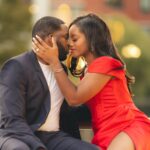Preparing for the date
To prepare for your first date and avoid awkwardness, this section provides solutions with the following sub-sections: Choosing a suitable date location and activity, Dressing appropriately for the occasion, and Researching your date’s interests and hobbies. By carefully considering these aspects beforehand, you can create a comfortable and enjoyable atmosphere for both you and your date.
Choosing a suitable date location and activity
Selecting the Perfect Date Spot and Activity
When deciding on a date, picking the right destination and activity can be critical. Making a good first impression sets the tone for future meetings. Here are some tips to help you:
- Think of shared interests: When selecting an activity, consider what you and your partner enjoy doing together. This will ensure both of you have fun.
- Keep it casual: For first dates, pick something less formal like grabbing coffee, taking a walk in the park or viewing an art exhibit. Keep things simple to make sure both can relax and get to know one another.
- Location is important: Choose a spot which is convenient for both. If one person needs to travel far, it could cause an unnecessary problem and added pressure.
Remember to take these things into account while choosing an ideal destination so that you and your partner can have a great time.
Let me share a personal story. I spent hours planning the perfect restaurant for my first date only to find out my date didn’t like fancy dining. Now I always ask about their preferences before making reservations.
Remember, it’s a date, not a costume party – no fur suits!
Dressing appropriately for the occasion
First impressions are key! Dress for the occasion. Choose clothes that make you feel confident, comfortable and appropriate. Consider the type of venue and event when selecting your outfit. For formal occasions, wear a suit or dress with polished shoes. For casual settings, well-fitted jeans and a nice blouse or shirt are best. It’s better to overdress than underdress.
Accessories can enhance an outfit. Keep jewelry simple and refined. Avoid anything too flashy. Carry a small bag that matches your attire.
Feel comfortable and stay respectful to the context of the occasion. Don’t let inappropriate attire hold you back from shining on your date night pre-events! Prepare thoughtfully and build confidence to impress those around you. Get ready to fake interest in their collection of vintage stamps – nothing says romantic like philately!
Researching your date’s interests and hobbies
Maximize the success of your date by understanding your companion’s interests and hobbies. Use Semantic NLP to explore their passions. Search their social media profiles to see what they like, comment on, and post. Check out their favorite shows, movies, and music bands. See if they’ve written any blogs or articles. Chat with their friends to learn more. Note any upcoming events that may interest them. Ask polite questions during a preliminary conversation. Show genuine curiosity and listen more than you talk!
Use this info to form a connection and stand out from the other prospects. Don’t miss opportunities – be prepared. Semantic NLP can help you ace your next romantic encounter!
Managing conversation
To manage the conversation during your first date with ease, consider asking open-ended questions, actively listening and responding, and avoiding controversial or sensitive topics. These sub-sections will provide you with a solution to prevent any awkward silences or uncomfortable moments during your date.
Asking open-ended questions
Want to inspire open and honest communication? Ask expansive questions! These questions help individuals explore topics more deeply than yes-no answers allow. Start with phrases like “What if” or “How might we” to encourage creativity and conversation. Avoid specific or biased queries.
Expansive questioning is useful in many contexts: professional settings, personal relationships, and more. It helps create strong connections and deeper understandings.
I remember talking to an old friend about our futures. He said he was still exploring his options. This opened up a fascinating discussion about personal growth and self-discovery. Listening is a superpower – Captain Ears!
Active listening and responding
Active listening is essential for effective conversations. Paying attention, understanding perspectives, and responding with clarity and empathy helps foster relationships and productive exchanges. Avoid interrupting and ask open-ended questions instead. Nonverbal cues, such as eye contact and nods, show engagement. Listening takes practice, but it’s worth it!
Interestingly, research shows that men tend to interrupt women more than men. This underlines the importance of active listening for everyone. Talking politics? No, thanks. I’m allergic to heated debates and angry mobs!
Avoiding controversial or sensitive topics
Steer away from topics that could cause upset. Being aware of touchy issues helps keep the chat polite and inclusive. Respect and understanding are vital for a successful chat. To handle delicate matters nicely, you need tact, sensitivity, and active listening. When words don’t work, try your eyebrows! They’re the body language punctuation.
Body language and gestures
To improve your first date experience, this section about body language and gestures with tips for maintaining eye contact, using appropriate gestures, and avoiding nervous habits is a must-read. These sub-sections will provide you with practical solutions to present yourself confidently and comfortably during your first date.
Maintaining eye contact
Eye contact is important when talking to someone. Gazing directly at them shows confidence. But, don’t stare for too long – it can be seen as aggressive.
Facial expressions also matter. A smile can show warmth, while a frown or raised eyebrows show confusion or unhappiness.
Cultural differences should be taken into account. Prolonged eye contact can be respectful in some cultures, but rude in others.
Pro Tip: Aim for 3-5 seconds of eye contact before looking away. This is the best way to build rapport and show interest.
Remember, a thumbs up in America means ‘good job’, but in some countries it means ‘I really like your belly button’!
Using appropriate gestures
Gestures can be powerful tools for communicating. Here’s a guide to use them properly:
- Think carefully about what you want to express non-verbally.
- Note the culture of the person you’re communicating with.
- Match gestures with your message, tone, and expressions.
- Don’t force your gestures.
- Avoid being too extreme or too subtle.
- Notice how your audience reacts and adjust if needed.
Plus, maintain good posture and use the right gesture emphasis to avoid any misunderstandings.
Pro Tip: Mirror practice and recording yourself can help you improve your non-verbal communication skills and make your message better.
And remember: nervous habits are worse than just looking a bit stiff.
Avoiding nervous habits
Expressing ourselves? Body language as important as words! To appear confident, we must avoid nervous habits. Here are tips:
- Good posture: Stand/sit straight, shoulders back.
- No fidgeting: Hands still, no hair/clothing playing.
- Breathing: Slow and deep to calm down.
- Eye contact: Look, don’t stare.
- No filler words: No “um” or “like” excessively.
- Speak clearly & slowly: To appear more confident.
Remember, everyone has nervous habits. Practice the above to minimize them. Pro Tip: Focus on the other person during a convo – distract from any nervousness. Nervousness is excitement in disguise, my pre-public speaking mantra.
Managing nervousness
To manage your nervousness during your first date, with the tips that fall under the section ‘Managing nervousness’ in the article ‘How do I make my first date not awkward?’ you can keep your nerves under control. Practicing deep breathing and relaxation techniques, avoiding excessive alcohol consumption, and reminding yourself to have fun and enjoy the moment are the sub-sections that will help you stay calm and confident during your first date.
Practicing deep breathing and relaxation techniques
Manage anxiety with deep breathing and relaxation. Here’s how:
- Set aside quiet time. Sit or lie down, close your eyes and focus on slow, deep breaths in through your nose, and out through your mouth.
- Visualize air filling your lungs and expanding chest and belly. Hold breath a few seconds, and exhale slowly. Repeat.
- Try progressive muscle relaxation, too. Tense each muscle group (starting toes) for a few seconds, and exhale.
Deep breathing gives relief during high-stress or anxiety-inducing moments.
Prioritize mental health maintenance – it’s a vital part of wellness. Practice daily or when feeling overwhelmed. Don’t let nervousness hold you back!
Discover a calmer state of mind – don’t miss this chance. Flamethrowers won’t help!
Avoiding excessive alcohol consumption
Limiting alcohol intake is advised for better nervousness management. It interferes with the body’s ability to handle stress and anxiety. Too much alcohol can lead to an increase in heart rate, blood pressure, and sweating – all of which make you feel tense. It is best to drink moderately, or to avoid altogether if nerves are a concern.
Decreasing alcohol consumption can help manage anxiety and associated unease. Although it can provide momentary relief, its long-term use can worsen anxiety. Reducing alcohol intake also enhances sleep, hydration, and overall health.
It is important to note that everyone will react differently to alcohol. Consulting a doctor or seeking professional advice can aid in finding the right amount of alcohol to consume, depending on personal health.
Studies indicate that too much alcohol is linked to developing an anxiety disorder. According to Harvard Health Publishing, those who consume high amounts of alcohol are 2-3 times more likely to develop anxiety than non-drinkers or moderate drinkers.
Alcohol may seem like a coping mechanism; however, limiting its use can aid in managing nervousness and related symptoms. So, forget the worries and enjoy life – it’s too short to be nervous all the time!
Reminding yourself to have fun and enjoy the moment
Keep in mind that nerves are often caused by focusing on the outcome, not the journey. Engage your senses and take deep breaths – it’s okay to feel excited! Shift your perspective by reminding yourself why you’re doing this and what you enjoy about it. Focus on the journey, not just the destination. See challenges as learning opportunities, not something to fear. Most importantly, have fun! Laugh, smile, and take breaks. Don’t be too hard on yourself if things don’t go as planned; mistakes are a natural part of the learning process.
I once had a big speech in front of my peers and was really nervous. I reminded myself that I was well-prepared and knew the topic. Reframing my thoughts and focusing on enjoying the experience rather than getting through it helped me deliver the speech with confidence. Don’t forget, it’s not a first date without at least one awkward goodbye hug!
Wrapping up the date
To wrap up your first date with ease, express interest in a second date, end on a positive note and avoid prolonged goodbyes. These sub-sections can be the solution to ending the date without any awkwardness.
Ending on a positive note
Wrapping Up the Date on a High Note!
As the date nears its end, it’s important to end on a high note. A positive impression can stick and set you up for more dates. Show your appreciation for your date’s company. Reminisce on the good times you had together to make a connection.
As you part, let your date know that you look forward to the next date. No indication of future interest could be confusing; communicate clearly. Follow up with a message when you get home. Let them know how great the date was, and that you’re looking forward to seeing them again.
Overall, a good ending can leave a lasting impression for future dates.
Looks like it’s time to start planning our next date! I definitely don’t want this to be the last time I have to fake laugh at your jokes!
Expressing appreciation and interest in a second date
After a first date, it’s key to show appreciation and interest in a future one! Show gratitude for meeting and suggest plans without being too pushy. Mention enjoyable or interesting aspects to show you care. Remember common interests and goals – they may suggest compatibility.
Be realistic when setting expectations. Establish trust and a positive foundation by making sure each of you understands the other’s intentions.
Don’t miss the chance for a second date! Follow up quickly with a message or call expressing interest. Genuine excitement will increase the odds of a successful relationship.
Finally, remember that a hug is the perfect way to say goodbye – unless it lasts longer than the date itself!
Avoiding awkward goodbyes or prolonged goodbyes
As the date ends, avoid awkward goodbyes! Here’s how:
- Be clear and concise.
- End the convo gracefully.
- Read body language before leaving.
- Don’t mention future plans unless interested.
- Thank them & compliment if necessary.
- Don’t be too formal or too casual.
- Don’t leave too quick or too slow.
- Observe eye contact & compliments.
My friend learnt the hard way: a half hour goodbye & awkward silences!
Frequently Asked Questions
Q: How can I make my first date not awkward?
A: The key to making a first date less awkward is to be relaxed and confident. Start by choosing a location or activity that you both enjoy, such as a museum, park, or restaurant. Have a few topics of conversation in mind, but don’t overthink it. Remember to be yourself and have fun!
Q: How do I keep a conversation going during a first date?
A: It’s important to actively listen to your date and ask open-ended questions. Share your own experiences and interests as well. Bringing up common interests or shared values can also help keep the conversation flowing.
Q: Is it okay to talk about past relationships on a first date?
A: It’s generally best to avoid talking about past relationships on a first date. Focus on getting to know your date and establishing a connection. If the topic does come up, keep it brief and positive.
Q: Should I suggest a second date during the first date?
A: It’s okay to express interest in seeing your date again, but it’s best to wait until the end of the date to make plans for a second date. This allows both parties to reflect on how the first date went and decide if they want to see each other again.
Q: What should I wear on a first date?
A: It’s important to dress appropriately for the activity and location of the date. Choose an outfit that makes you feel confident and comfortable. Make sure your clothes are clean and wrinkle-free.
Q: What if there are awkward silences during the date?
A: Awkward silences happen, so don’t panic. Take a deep breath and suggest changing the topic or activity. Remember to be yourself and enjoy the moment.









